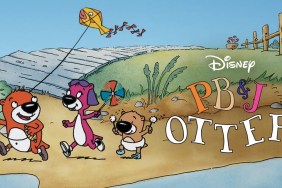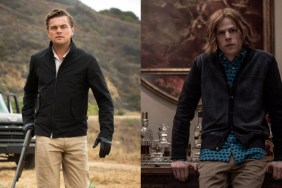
If I had to pin down just what exactly Clint Eastwood’s J. Edgar was all about, I’d say it’s the story of the titular FBI director’s relationship with associate director Clyde Tolson and the disapproving scorn of his mother who didn’t want her son to grow up to be a “daffodil.” It’s a story of a man met on all fronts with barriers he must overcome to get anything done, but the one wall he was never able to break through was the one that would allow him to finally accept Tolson as a lover and not just a close friend. Too bad this is all presented in such a meaningless, inconsequential manner, and ultimately places less emphasis on what could be considered more interesting and factual aspects of J. Edgar Hoover’s life.
J. Edgar is Brokeback Mountain meets The King’s Speech, the only difference being I believed and was moved by the friendship between King George VI and his speech therapist Lionel Logue in The King’s Speech and Brokeback Mountain had a story to tell, not one to hint at and hide. Considering there is no concrete historical evidence that paints J. Edgar Hoover as gay you can feel this production going out of its way to try and suggest Hoover had a homosexual relationship with Clyde Tolson without actually saying it, almost as if they wanted to ensure themselves an “out” should people question it. Unfortunately, it isn’t subtle, a lot can be said in a look and the film’s overall metaphor doesn’t ring true unless you truly believe Hoover was a closet homosexual. So I find it hard to believe Eastwood and screenwriter Dustin Lance Black didn’t approach the material with those full intentions, which is fine, but commit to it.
What’s most disappointing is that the Hoover and Tolson relationship slowly becomes the focus of the film, which is to insinuate the one fact that cannot be confirmed about Hoover was the most interesting thing about him. Other aspects of Hoover’s career are addressed, from his feelings toward Rev. Martin Luther King Jr., his dealings with Robert Kennedy and his meetings with each new sitting president, but most only in passing.
Obviously it confronts the kidnapping of Charles Lindbergh’s baby, it touches on Hoover’s advancement in using science to catch criminals, bank robbers such as Dillinger and Baby Face Nelson are mentioned, but the most time is spent dealing with Hoover’s secret files, an undoubtedly important piece of Hoover’s legacy, but again, like his sexuality, little is known about the contents of these files so it’s impossible for the film to treat their contents as fact.
Eastwood tells Hoover’s story in a fractured narrative, bouncing around from his time working for Attorney General A. Mitchell Palmer, including the Palmer Raids in late 1919, to his promotions in the Bureau of Investigation and ultimately becoming the first Director of the FBI in 1935, a position he held until he died in May of 1972. The film unnecessarily goes back and forth between these dates as Hoover recites his memoirs, telling of past victories and shaping history to suit his image.
We are first introduced to Leonardo DiCaprio as Hoover with his face encased in latex, giving him an awkward, bee-stung wax mold appearance. In some light it looks realistic while in others it’s altogether distracting. There are times I felt I’d gotten used to the make-up, but scenes change and both DiCaprio as Hoover and Armie Hammer as Tolson are made to look only like actors wearing masks, limiting any impact the scene may actually hold. For most of the film all I could do was wonder why Eastwood didn’t just tell a linear narrative and cast Jon Voight and James Cromwell as the elder versions of each character rather than turn them into foam rubber caricatures.
As Hoover, DiCaprio does well, but his commitment to the character is lost. His voice affectation never quite works, especially when we move out of the 20s and into Hoover’s later years and we still have the same young voice coming out of this latex composite. Same goes for Hammer, though I was hardly impressed with his performance, particularly one climactic scene where Hoover and Tolson get into a shouting match leading up to a confrontation that seems forced and never rings true.
The most affecting performance of the lot comes from Naomi Watts as Helen Gandy, Hoover’s personal assistant during all his years at the FBI and keeper and destroyer of his personal files. Watts gives the most convincing performance and throughout the film offers a character with the most questions to be asked. Just who was this woman that dedicated her entire life to her career, was never married and stuck by Hoover until the end? The film doesn’t care to answer these questions, but perhaps Watts’ performance was never meant to outshine everyone else.
Eastwood and cinematographer Tom Stern (Gran Torino, Changeling) once again shoot the film in steely grey tones, limiting the amount of color to be seen, which becomes just one more thing you notice as the narrative offers very little to care about. Eastwood also continues to serve as his own composer, layering the film in soft piano tones just as we have heard in virtually every film he has composed on his own, which is just one more aspect of J. Edgar that feels tired and lazy, not to mention unnecessary, as delicate notes begin to play almost out of nowhere in scenes where a score is entirely needless.
In the end, J. Edgar feels like a film lacking in confidence. I saw little reason for most of Eastwood’s shot choices and the editing was a muddled mess. If Eastwood and Black’s goal was to make a movie that served as an actual metaphor for the character they created on screen then they have a success, because J. Edgar lacks the confidence and security just as does the Hoover DiCaprio was asked to play.
Was Hoover gay? Was Tolson gay? Did they have a close friendship or was it something more? Perhaps these questions are the key to understanding Hoover, but to make a film that doesn’t know the answers and yet centers its story on the questions is worthless. Through all its attempts at subtlety, J. Edgar is an unsubtle, emotionless thunk on the head as two men in rubber masks struggle to profess their love for one another as Eastwood gently tickles the ivories and the film fades to black.









